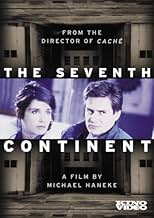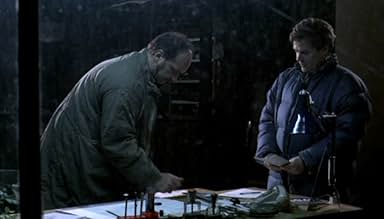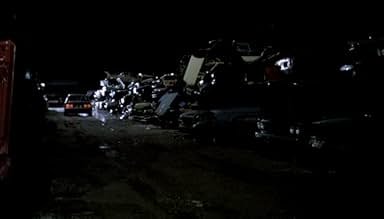NOTE IMDb
7,6/10
18 k
MA NOTE
Ajouter une intrigue dans votre langueThe daily routines of a seemingly ordinary Austrian family begin to take on a sinister complexion.The daily routines of a seemingly ordinary Austrian family begin to take on a sinister complexion.The daily routines of a seemingly ordinary Austrian family begin to take on a sinister complexion.
- Réalisation
- Scénario
- Casting principal
- Récompenses
- 2 victoires et 1 nomination au total
Jennifer Rush
- Self
- (images d'archives)
- (non crédité)
Avis à la une
Unnecessarily long and repetitive scenes intended to convey the boredom of the middle class Austrian family are undoubtedly a brilliant exhibition of cinematic art, but to me they only underline the totally unbelievable premise of the film. There was simply no reason for this family to be in despair: the man had a good white collar job and was recognized by his employer, the wife had a responsible entrepreneurial position and the daughter, while sometimes bizarre, was hardly a reason for her parents' perceived hopelessness. A man and a wife who are able to function effectively in every day life for the period of the film, three years, with no apparent psychoses, are not likely to engage in the incredible acts leading to the dramatic climax. The technical aspects of the film were interesting: short scenes, some without apparent relevance (the daughter's itch) with relatively long pauses between; the acting was a bit mechanical, sort of robotic, but that was undoubtedly intentional to convey the nihilistic mood of the protagonists. I didn't think the movie was worth watching, but most critics disagree, so if you enjoy this type of movie, then it is definitely for you.
Arguably, no greater cinematic interpreter of alienation exists in the world today than Austrian director Michael Haneke. Haneke shows us characters whose response to the world around them has deadened, people who have forgotten how to feel, how to love, how to care. The Seventh Continent, the first film of the trilogy that, with Benny's Video (1992) and 71 Fragments of a Chronology of Chance (1994), depicts what Haneke has called "my country's emotional glaciation." Based on a true story of the disintegration of a middle class Austrian family, the film has little plot, only incident and observation. Divided into three parts and shot in episodic fragments, as in his 2002 film Code Unknown, each fragment is tenuously connected by fadeouts in which scenes start and end abruptly. A mood of banality is established early in an extended sequence in which a car moves through a car wash showing all the details of detergent sprays, high-pressure washers, and rotating brushes. At the end of the car wash is a travel poster beckoning tourists to visit Australia with a peaceful scene of sand and water, a motif that is repeated periodically during the film.
The Schobers, husband George (Dieter Berner), wife Anna (Birgit Doll), and daughter Eva (Leni Tanzer), are the happily married family living next door. George is an engineer and Anna an optician. Eva is a bright child of about eight with deep, expressive eyes. The family moves through their morning ritual with precision -- brushing their teeth, feeding the fish, and eating breakfast with little conversation or emotional interaction. The camera avoids their faces, focusing on mundane objects such as a bowl of cereal, an alarm clock, a fish tank, a package of congealed broccoli. This preoccupation with objects underscores the lack of connection between the characters and the things they have acquired. We get our first hint that something is not right when Eva pretends to her teacher that she has lost her eyesight. Anna questions her about the incident, promising not to harm her if she tells the truth but, when Eva admits to the lie, suddenly slaps her across the face ignoring the fact that she is a very troubled little girl. It is from here that the cracks begin to widen.
Depicting ritualistic actions like counting of money at a supermarket, the distractions of television, the meaninglessness of work, the film reflects the powerlessness and isolation of people in modern society. Haneke chronicles a family enslaved to the structures they have created, operating in a morass of emotional vacuity. The first hour may seem slow but it builds considerable tension until it reaches a shattering climax. Little by little the family disengages. George quits his job and writes letters to his parents hinting of something dark about to happen. In the absence of a spiritual core, without the possibility of meaningful action, the family sinks deeper into an abyss, unraveling and discarding the tightly woven structures of their life. Similar in theme to Todd Haynes' 1995 film Safe but with three times the power, The Seventh Continent is a ruthlessly intelligent film that burns its way into your psyche, leaving an indelible mark that will forever haunt your dreams.
The Schobers, husband George (Dieter Berner), wife Anna (Birgit Doll), and daughter Eva (Leni Tanzer), are the happily married family living next door. George is an engineer and Anna an optician. Eva is a bright child of about eight with deep, expressive eyes. The family moves through their morning ritual with precision -- brushing their teeth, feeding the fish, and eating breakfast with little conversation or emotional interaction. The camera avoids their faces, focusing on mundane objects such as a bowl of cereal, an alarm clock, a fish tank, a package of congealed broccoli. This preoccupation with objects underscores the lack of connection between the characters and the things they have acquired. We get our first hint that something is not right when Eva pretends to her teacher that she has lost her eyesight. Anna questions her about the incident, promising not to harm her if she tells the truth but, when Eva admits to the lie, suddenly slaps her across the face ignoring the fact that she is a very troubled little girl. It is from here that the cracks begin to widen.
Depicting ritualistic actions like counting of money at a supermarket, the distractions of television, the meaninglessness of work, the film reflects the powerlessness and isolation of people in modern society. Haneke chronicles a family enslaved to the structures they have created, operating in a morass of emotional vacuity. The first hour may seem slow but it builds considerable tension until it reaches a shattering climax. Little by little the family disengages. George quits his job and writes letters to his parents hinting of something dark about to happen. In the absence of a spiritual core, without the possibility of meaningful action, the family sinks deeper into an abyss, unraveling and discarding the tightly woven structures of their life. Similar in theme to Todd Haynes' 1995 film Safe but with three times the power, The Seventh Continent is a ruthlessly intelligent film that burns its way into your psyche, leaving an indelible mark that will forever haunt your dreams.
One of the most chilling movies I have ever seen, the idea for this film was reportedly sparked by real events in Austria. Similar to "Safe" in its depiction of modern anomie, but more powerful. The director is much more sympathetic to the characters than Todd Haynes was in his film.
I think that many people will be able to identify with this film. As always, I made a point of knowing virtually nothing about it before I saw it, and I'd recommend doing the same. If you know about the plot beforehand, the impact will be markedly ruined. The first thought that came to mind after the first few sequences was "they haven't shown anyone's face yet".. I guess that's the point. If you are reading this, then you most likely are not starving, and are amongst the rich 1 billion of the world. So the actions portrayed initially in this middle class existence needn't any face, as they pertain to all of us, we the regurgitators of human aspirations (weird phrasing). We don't have a face, as there is nothing to tell us apart from the next person. Anyway, it's absurd to think that the mental process that took over the family is considered an exception, but the fact that it is only highlights how sick our society is, refusing to remodel this cataclysmic and decerebrate way of being. I was affected by the subsequent events that transpired, and one particular scene still haunts me in a vicious way, although it cannot be mentioned here... suffice to say it broke free from a certain degree of apathy shown by the main characters throughout, revealing the desperate and twisted cry of raw emotion that can exude from even the most planned chaos. Watch it all the way through, it is meant to bore you for a while, it wouldn't be the same if it didn't.
Der Siebent Kontinent is a film you should watch. It is not pleasant neither does Michael Haneke uses any tricks in order to even interest you about the characters or their lives. Yet, it is as powerful as an atomic bomb during peace time. It is LOUD and its message (which is whatever you want it to be) is right in your face.
It is amazing how a masterpiece needs no soundtrack, fancy camera work or explicit and extended dialogs.
Unfortunately, it is very hard to find. The screenings are rare and no personal editions on VHS or DVD exist as far as I am aware. Many will recognize the "Piano Teacher" approach to directing but, this is as powerful as it can get. One of the finest examples of style not overlapping form.
Treat yourself with this lesson. Watch it if you can. Specially if you experienced depression at a given time in your life.
It is amazing how a masterpiece needs no soundtrack, fancy camera work or explicit and extended dialogs.
Unfortunately, it is very hard to find. The screenings are rare and no personal editions on VHS or DVD exist as far as I am aware. Many will recognize the "Piano Teacher" approach to directing but, this is as powerful as it can get. One of the finest examples of style not overlapping form.
Treat yourself with this lesson. Watch it if you can. Specially if you experienced depression at a given time in your life.
Le saviez-vous
- AnecdotesBased on real events.
- Citations
Georg Schober: We have to cancel the newspaper subscription
Anna Schober: Mhm
- ConnexionsFeatured in Selección TCM: Michael Haneke (2012)
- Bandes originalesSend Me Roses
(uncredited)
Written by Günter Mokesch and Karin Raab
Performed by Günter Mokesch and Karin Raab
Meilleurs choix
Connectez-vous pour évaluer et suivre la liste de favoris afin de recevoir des recommandations personnalisées
- How long is The Seventh Continent?Alimenté par Alexa
Détails
Box-office
- Montant brut mondial
- 428 $US
Contribuer à cette page
Suggérer une modification ou ajouter du contenu manquant


























